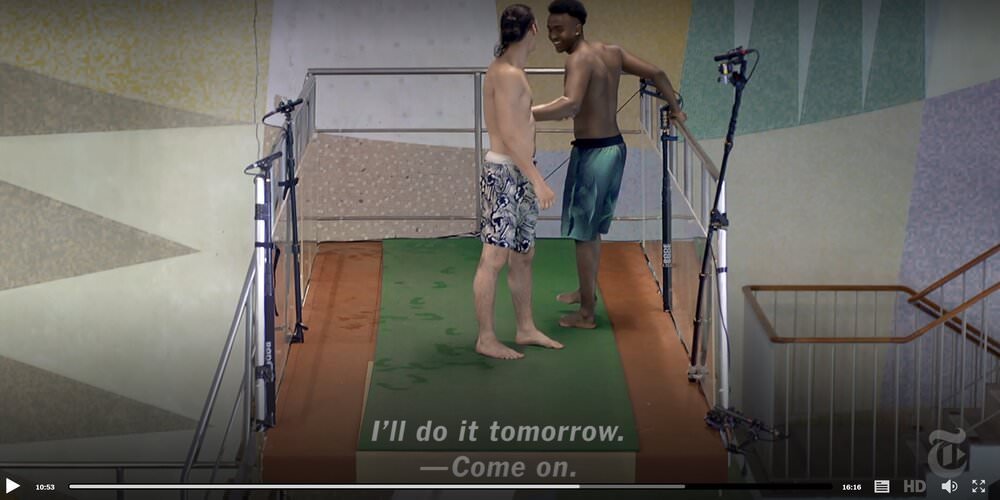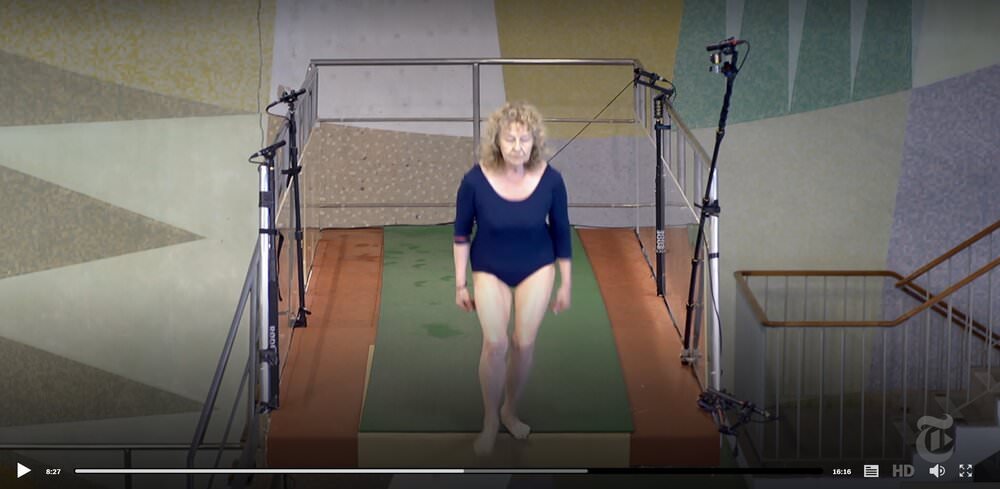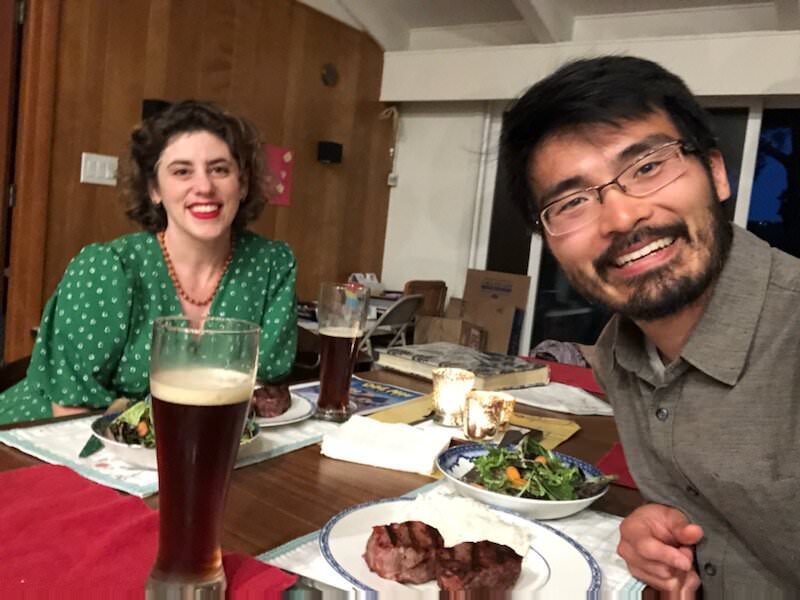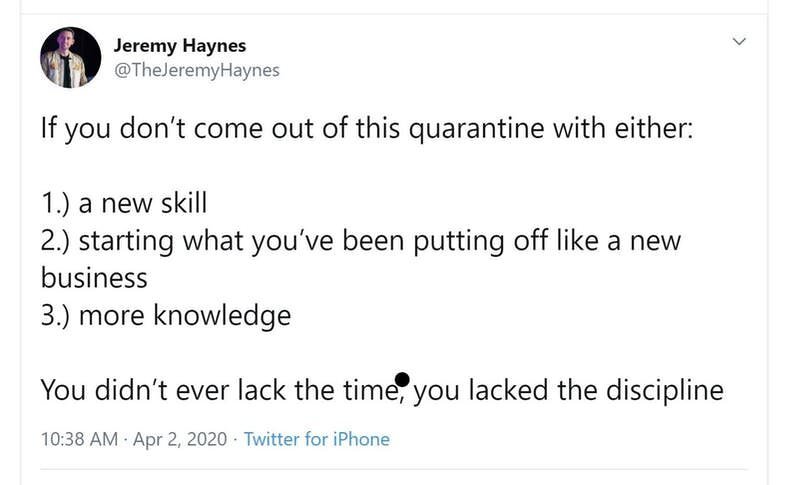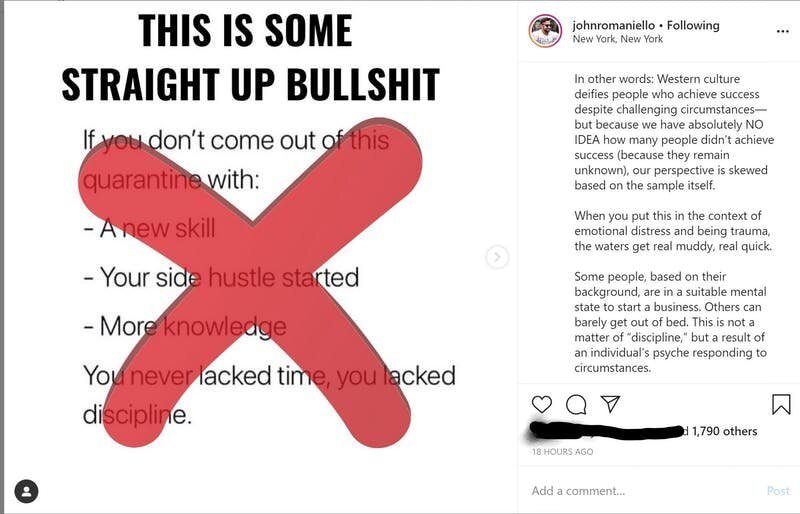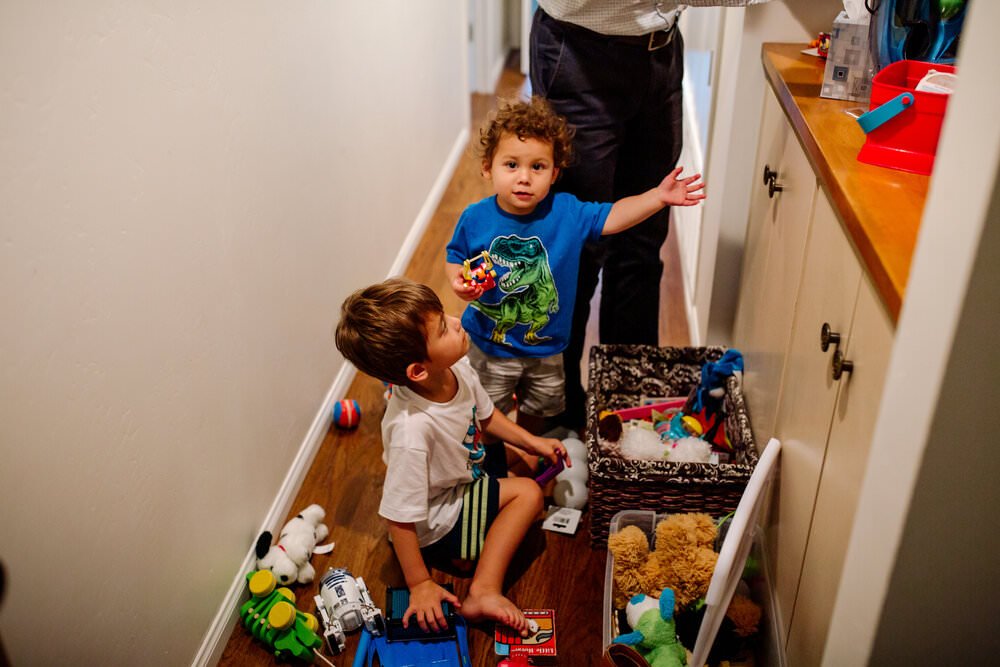Essays on Writing Craft and Mindset
by Maggie Frank-Hsu
Scrappy
We’re all ambitious here. “I want to do things better than anyone has ever done them before!” For some of us, our ambition perverts itself into a perfection we can never reach. “I want to do things the absolutely right way.” If you wait until you’re ready you’re going to miss opportunities.
We're all ambitious here. “I want to do things better than anyone has ever done them before!”
For some of us, our ambition perverts itself into a perfection we can never reach. “I want to do things the absolutely right way.”
If you wait until you’re ready you’re going to miss opportunities.
Business opportunities and opportunities to make money, yes. But also opportunities to avoid your anxiety over what might go wrong.
If you wait until you have all your ducks in a row and you’ve researched everything, and you are 100% confident in what you’re doing, you start to build the thing up in your mind. “This is going to come out REALLY WELL. It has to now, I’ve put so much time in.”
I was in a group coaching session for entrepreneurs this morning. The leader said, “We have to be scrappy in this time. We have to try things, see if they work or not, and then move on.”
My clients are usually really surprised to hear that I value scrappiness.
I guess people are surprised to hear that someone who coaches people to find their ONE, BIG, BOLD idea - the idea that will define them as a thought-leader in their industry - also thinks we should do things off the cuff.
Well, YES, I do. Because scrappiness saves you from the anxiety that comes with overthinking. I hate feeling anxious and I am sure you do, too. There's a time and a place for careful planning.
But trying something new isn't always one of those times.
The whole process is the exact same thing as when you stand on the diving board. (Captured in this brilliant short film.)
You can think and think and think.
Or you can just jump.
Either way, if you stay in business long enough, eventually, you’re jumping.
But scrappiness protects your energy from all that pre-jump anxiety. AND it saves you from talking yourself out of jumping, too.
“We have to be scrappy in this time.” If you weren’t practicing scrappiness before the catastrophe, try it now. You can always go back to your way later.
M
PS: Remember, you can think and think and think. Or you can jump.
What if it is OK to have fun?
Fun can’t wait until I get all the important stuff done because I never get it all done. If I try to get all the important, responsible stuff done then I maybe get more stuff done that day. But I’m dead inside. ? My impulse to withhold permission to have fun until after I’ve been responsible “enough” reminds of the pre-Covid craze over de-cluttering.
Fun can’t wait until I get all the important stuff done because I never get it all done. If I try to get all the important, responsible stuff done then I maybe get more stuff done that day. But I’m dead inside. ?
My impulse to withhold permission to have fun until after I’ve been responsible “enough” reminds of the pre-Covid craze over de-cluttering.
I’ve attempted de-cluttering over the past few years. It’s pretty impossible to keep it up with little kids.
Nothing personal against Marie Kondo, but now that we are all here all the time, de-cluttering has gone from impossible to laughable. If I wait until my house is de-cluttered to give myself permission to enjoy it, I’ll be waiting forevah.
But! I do love a clutter-free space.
So nowadays, I create temporary clutter-free spaces when I need them. In other words...
I just move all that shit out of my line of sight for a while.
The pile goes off to the side so I can have some free space in front of me. Then I put the pile back when I’m done.
I get a free and clear space. And I don’t expend the physical and emotional energy to put every item away, when all the items will just reappear in a few hours (or minutes) because everybody living here spends all their time here now.
Like on Saturday, Alan and I celebrated our seventh wedding anniversary.
We moved (most of) the toys/books/electronics/clean clothes OFF the dining room table, and set it up for ourselves to eat a nice dinner.
We decided we didn’t have to expend the energy on perfectly putting everything back in its place in order to clear space for ourselves.
And I know you know about self-care, but I’m not exactly talking about self-care.
I’m just talking about moving the mental clutter out of your line of sight for a while so you can have some fucking fun.
Fun, as Esther Perel notes, is not just “trivial, or an aside, but is actually one of the most powerful antidotes to death or to the feeling of deadness that so many of us are currently living with. … Play, connection to anything that celebrates life like that, curiosity, imagination, exploration, pleasure are actually survival tools. They are that essential to our.. sense of hope.”
XO
- Maggie
PS:
A few weeks ago, I talked about writing being a place I go, not a thing I do.
That place is there for you, too, whenever you want to go to it. Sometimes you can’t get there unless you move all the clutter to one side. So do that.
I promise you, the clutter will be there when you get back. (And if you want to talk about how to move it to one side, or why I’m wrong, hit reply. I’m here.)
Protesting the Tidal Wave
So this is hard, huh? I’m annoyed with everyone and tired of everything. Including myself. I turn judge-y when I feel deprived. “Why are those cyclists riding in a group? They’re going to get cycling banned.” “Why does she feel the need to buy that much rice? She’s the reason I couldn’t get rice last week. Compulsive hoarder.” Et cetera. And people are judging me, too. I know because they tell me.
So this is hard, huh?
I’m annoyed with everyone and tired of everything. Including myself.
I turn judge-y when I feel deprived.
"Why are those cyclists riding in a group? They're going to get cycling banned."
"Why does she feel the need to buy that much rice? She's the reason I couldn't get rice last week. Compulsive hoarder."
Et cetera.
And people are judging me, too. I know because they tell me. I’m not covering my face right. I’m accidentally too close to them.
There’s a right way to do this catastrophe! Do it right because what you do affects me!
Then I read about the people who protested last weekend. I don’t agree with them, to put it mildly. I think they’re advocating for a decision that could reverse our progress and re-ignite the spread of the Covid-19.
But I also noticed that very few people actually engaged in these protests over the weekend. (200 in downtown San Diego, a city of 1.4 million.)
So why did the protest of 0.01% of the city's population make the front page of the paper the next day?
....
We’re engaging in physical distancing because we’re scared. We’re scared we or someone we love will get sick, very sick, and maybe die.
But, we're not just engaging in physical distancing because we’re scared.
We’re also doing it because we have empathy.
We have empathy for people in our community who have a higher risk of dying from Covid-19. They need us to stay away from each other so that they don't interact with the delivery guy who interacted with someone who interacted with someone who has Covid.
If we care about the people in our community enough to do physical distancing and stay at home as much as possible, then we have to examine our impulse to excoriate these unwise protesters.
The protesters are scared of what will happen if they can't go back to work soon. They believe that people who work are the Good Guys. They've been separated against their will from the possibility of being on Team Good Guys.
Yes, their position is unwise. Yes, they make it hard to care about them.
But the protesters are scared and vulnerable. If we care about scared, vulnerable people, that means we care about the protesters, too.
They are part of the fold.
Everybody's part of the fold.
Fear divides us. We shout at the protesters, “What you do affects me, dummy!”
And fear unites us because the protesters feel fear, too. Fear of the challenge to what they think the Good Guys should do. Afraid over what it means for their version of reality. “What you do affects me, dummy!” they shout back.
They dismay me but I won’t start believing they we're not part of the same community. That dehumanizes them. When something’s not human, I don’t feel for it. Anything can happen to it and I won’t care.
I am annoyed and tired of everyone and of myself. But I am not kicking anybody out of the fold. How’s by you?
I can’t give you childcare. So I give you this.
If I’ve preached anything, I’ve preached, “Give yourself permission.” … Permission to think bigger. To have big ideas that take time and space to form. Give yourself permission to give them that time and space. I serve women in my business. Therefore, I’ve also found myself preaching, “Get a babysitter.”
If I’ve preached anything, I’ve preached, “Give yourself permission.”
…
Permission to think bigger. To have big ideas that take time and space to form. Give yourself permission to give them that time and space.
I serve women in my business. Therefore, I've also found myself preaching,
“Get a babysitter.”
Feel like you have too much to do and there’s never enough time? Get an after school babysitter from 3:30 to 5:30.
Feel like a shitty parent? Get a babysitter and take Saturday completely off so that on Sunday when your child starts literally every sentence with “I want,” you don’t scream in his face, “WE ALL WAAAAAANNNNNNNT. ”
Go without something else - eating out, haircuts, a gym membership, WHATEVER.
But get a babysitter.
Nothing is wrong with you.
You are not broken.
You are not bad.
You need space.
I preached that because I believe you can’t claim your personhood if you don’t have some time, outside of client-work time, that is kid-free.
Then Covid-19 happened.
Now the internal monologue doesn't sound like, “I want a babysitter but I have to defeat the societal message I’ve absorbed a.k.a. The “Inner Mean Girl” who says I don’t deserve a babysitter.”
Now, bringing a babysitter into your home carries risk, for that person and all the people they contact and for your own family and all the people you contact. A babysitter is another touchpoint that could spread the illness.
That’s if you even have the money or financial stability to hire someone.
So what does that mean now?
I wish I knew.
…..
When I worked as a marketer, my favorite part of the whole enterprise was the idea that marketing was about connecting a person to a thing that they needed to solve a problem in their lives.
But we all know that a lot of our most agonizing problems don’t have solutions we can buy.
When I identify those kinds of problems, acknowledge them, and name them, and bring them out into the light by talking to my friends and colleagues about them, I’m not solving them.
But I am banishing my shame over my struggle with them. (Thanks, Brene.)
And I am finding other women who are struggling with the same problem as I am, in private and ALONE.
Alone. As we struggle with so many unjust problems in this society.
I am bad because not having child care is not working for me.
I can't get my work done. What are my clients going to think of me?
I want to get a sitter so I can pick up the pieces of my mental health. I hate how selfish it feels to say that.
I’ve always wanted to homeschool anyway. I mean, I wanted to do it maybe 5 years from now but I guess I can make this work!
Other women on Instagram are doing well with this. What am I missing?
....
Nothing is wrong with you.
You are not broken.
You are not bad.
You need space.
.....
Before Covid-19, we were having a conversation about questioning the default position.
The default position that everyone’s needs must always come ahead of our own as mothers, wives, and workers.
When Covid-19 happened, the collective sigh I heard from some women who had just started questioning those defaults was something like,
“Ah, I knew it. I knew I didn’t deserve that child care. I knew I didn’t deserve that space for myself. And here’s the ‘universe’ confirming that for me.”
Am I saying you should get a babysitter? No, I am not commanding you to get a babysitter.
But I do know that we can’t wait until Covid-19 ends to question the default position that we should martyr ourselves because we are moms and that’s what moms do.
We don’t have to decide that because we don't have time to tend to our personhood separate from our kids, that means we should deny we have the need to tend to our personhood right now.
I'm starting to think maybe it’s never been about getting a babysitter.
A worldwide catastrophe cannot tell you that you don’t deserve your personhood. Only you can decide.
Maggie
Writing Is Not a Hobby You Need to Take Up
I’ve seen a debate ping-ponging around the internet that’s silly and interesting all at once. Silly because… Everything. Has. Stopped. I’m not saying that means we all have nothing to do now. We all have more to do now than ever. But I’m saying… the way it was/what we had/life as we knew it… has stopped.
I’ve seen a debate ping-ponging around the internet that’s silly and interesting all at once.
Silly because…
Everything. Has. Stopped.
I’m not saying that means we all have nothing to do now. We all have more to do now than ever.
But I’m saying… the way it was/what we had/life as we knew it… has stopped.
Yet! The momentum from our absurdly productive society B.C. (before corona) continues to feed our anxiety over productivity in our current reality.
Honestly, when I look at the image above in the context of reality as I know it on April 8, 2020, the first thing I think is …
WHO CARES?
Who cares if I disappoint this rando guy on Twitter because I didn’t learn to play the guitar, or create a family game night tradition that my children remember for the rest of their lives, or WHATEVER?
But it’s interesting because a lot of people who saw this tweet as it evolved into a viral meme did care. A lot of people posted FURIOUS responses to it:
I think the meme touches off such an angry response because it reflects our inner critics back to us.
Before this guy on Twitter wrote this thing, my inner critic was already telling me that I suck for not learning the guitar right now. For not making this a magical time of family bonding. For… whatever.
The inner critic’s work is to silence us, and she takes her work seriously.
You might even hear her saying, “You think you have the time to take up a hobby right now?? Idiot. No one has time to take up a 'hobby,' and even if they do have time, they don’t have the emotional bandwidth.”
The inner critic doesn't stop me anymore from writing. Actually, she keeps me writing.
I keep writing through the storm because writing is not a hobby for me. It’s not a thing I’ll pick up now that I have time.
Writing is a place I go. Not a thing I do.
We can’t go anywhere physically right now. So, more than ever, we need proverbial places to go within our imaginations to demarcate the different areas of our lives.
I have the writing place.
I go to the writing place, where I can stretch into my full being. My aliveness. I can assert my right to feel joy. To feel free.
I go to that place by writing out my big ideas. Or by reading old stuff I’ve written. By taking notes on my thoughts, by writing stories, crafting essays. I go there. Often I share the stuff that comes out of there with you. I don't always.
But I don't go there to be productive. I create something when I'm there. But creating and producing aren't the same thing.
I go to writing because despite my inner critic’s best efforts she can’t actually get inside the writing place.
Whether you’re writing or not, I hope you have a place you go.
Maggie
PS: That inner critic voice pierces some of us so deeply in this moment. Of course we all know that. But I came across this video from Jay Shetty on Janet Jackson’s feed the other day. I’m not a Jay Shetty fan, but I liked this video because it highlights the stark difference between what we say to ourselves and what we deserve to say to ourselves. Go watch it and find a way to let go of some of that rotting crud.
Get my weekly letter delivered to your inbox AND my free Write When You’re Rusty guide. Sign up here.
I come with answers.
A couple of podcasters interviewed me last week for the EFF Perfect show. (Great chat. It’ll be out in June.) We talked all about how perfectionism erases us. I said things like, “While we sit on the sidelines waiting to create the perfect thing, we end up never saying anything at all.”
A couple of podcasters interviewed me last week for the EFF Perfect show. (Great chat. It’ll be out in June.)
We talked all about how perfectionism erases us.
I said things like, “While we sit on the sidelines waiting to create the perfect thing, we end up never saying anything at all.”
You know. My shtick.
Toward the end, one of the hosts asked me,
“OK, so how DO YOU actually get over your perfectionism to write and publish something?”
Now, if you’ve ever asked me a question about writing, you know I respond with something like,
“Well it often—but not always—depends and there are exceptions to every rule and I will tell you what I think but I WOULD ACTUALLY LIKE TO KNOW WHAT YOU THINK YADDA ET CETERA. ...What were we talking about again?”
But I didn’t do that this time because, you know what?
I knew the answer.
I exhaled and said,
“You only write when it's easier to write than not to write.”
Most people are not ready. I know, because for so long, I wasn’t ready.
Instead I was doing things like getting different, slightly better and slightly higher paying jobs, moving cities, moving apartments, traveling around Central America, dating people, breaking up with people, drinking really delicious cocktails, baking, oh yeah and writing... 11 pages of a book... that I probably won’t ever continue. Also, I was attending things. (I miss attending things.)
I found it easier to do all those things than I found it to sit down and write about my most cherished ideas.
Moving across the country (again) was easier. Competing in 3 triathlons within a year of birthing my first son was easier.
After a while, not writing stopped being easier.
I didn’t wake up one day and flip a switch.
I needed that time spent doing all those other things so I could wander closer and closer to a place where not writing became more painful than writing.
Not expressing—not exploring—where my life’s work lay became too painful.
I don't write weekly so that I can add another to-do to my endless list. I write weekly to alleviate the pain that I feel that I’ve spent 20 years of adulthood not saying what I want to say.
I've arrived at that place. That’s why my writing practice has stuck. Maybe you’re wandering closer to that place, too.
Maybe you're not wandering all that close yet. You need to set and reach other goals. You need to distract yourself. You need to feed the dream. Or you need to let the dream come terrifyingly close to dying.
I am here if you feel more ready than usual, and you want to talk about a process that takes you from feeling ready to voicing and crystallizing your biggest ideas. (Just email me)
I’m here if you don’t feel ready yet. That is OK, too.
And I’m glad you’re here. It means a lot.
Everything has changed. But some things have not.
Everything has changed. But some things have not. For example, perfectionism was a thing before this disaster and it’s a thing now. In some moments, I would like to acknowledge that I have needs, but that I can’t meet many of my needs right now because of this bat-shit, grueling, terrifying international emergency.
Everything has changed. But some things have not.
For example, perfectionism was a thing before this disaster and it’s a thing now.
In some moments, I would like to acknowledge that I have needs,but that I can't meet many of my needs right now because of this bat-shit, grueling, terrifying international emergency.
But I get the feeling that acknowledging that I have needs makes me a woman who is not doing this disaster “perfectly.”
Instead, they (Social Media? Culture? Pretty sure it’s patriarchy. Anyway,)... they assert that acting “perfect” during the pandemic means I should pretend I have no needs.
I should pretend I have no needs because my needs - to process my grief, to feel safe, to have space - can’t all be met right now. So why acknowledge that I have them?
And I am wondering…
What will it take for perfect to be over?
Will it take our reality dipping into a dystopian science fiction novel?
Apparently that is not enough.
...
This week, for the first time since I started this weekly letter, I questioned whether I should publish my own writing. I thought…
What will people think if I speak my mind right now? If I say I’m sad? What will people think of me if I say that losing my childcare hurts me badly and I actually don’t know how to cope with it?
The answer to all these questions: I don’t know what people will think. But as Cyndie Spiegel wrote in her email update yesterday,
“I won't allow uncertainty to keep either of us from connection.”
That was probably my favorite thing that anyone has said so far.
It may be cold comfort. It may be no comfort. But some things are the same as they were before. Like…
- Tomorrow is not promised.
- We can only control our actions, not the outcomes.
And…
- We don’t have to allow uncertainty to keep us from connection.
This week - the same week when I questioned whether I should publish - was also the week when more of my clients wrote and published than in any other single week since I’ve been coaching writers.
They are not allowing uncertainty to keep us from connection. That enlivens me, amigas.
Inspired by them, I’m going to go live on Instagram to talk about how we can acknowledge our needs even if we aren’t able to meet all our needs right now. This’ll be happening Tuesday-Thursday, 3/31 -4/2 at 1 pm PT/4 pm ET.
If you want to get notified when I go live, make sure you follow me (http://instagram.com/maggiefrankhsu). Then click “Following” Click Notifications >> Live Videos >> All.
Got that? Do your best.
Talk soon.
M
PS: Instagram saves the live videos, so if you can't make it live, follow me anyway so you can watch them later.
Read This While in Line for Costco
What really matters. A biz buddy of mine is organizing a free, low-tech summit called “The New Normal.” (More details below in the PS.) Anyway, she asked for volunteers to share presentations on how we’re “surviving this thing as a self-employed mom.”
What really matters.
A biz buddy of mine is organizing a free, low-tech summit called “The New Normal.” (More details below in the PS.)
Anyway, she asked for volunteers to share presentations on how we’re “surviving this thing as a self-employed mom.”
I texted her back, “My topic—working title—would be ‘how to continue to assert your personhood separate from your kids when you're suddenly with your kids all the time’. Let me know if that’s too esoteric.”
Nope, she said. “Not too esoteric. So important.”
Oh, that’s good, I thought. Now… to get busy on devising the answer.
…
I’ve had ups and downs, but overall life has gotten better, happier, and more successful as I’ve gotten older.
I am grateful for it.
I have often wondered, “What will happen the next time I fall on hard times? What will happen when a disaster comes? Will I care about the same stuff I care about now? What will I need to survive?”
...
So there’s this guy called Maslow who has a theory about all that.
But, my good friend Margo pointed out to me that Maslow’s hierarchy has a lot of holes.
As in… if Maslow is right about the hierarchy of needs, then why is it that when my biz buddy asked for topics related to “How to SURVIVE our new normal,” the first thing I thought of was,
“How do I continue to maintain my personhood?”
According to Maslow, I should be on
“How to eat emergency Go-Pack canned food in front of my children without crying because I never thought in a million years I’d actually have to eat some whack-ass Go-Pack canned food?”
Or… “How to wipe my ass when I run out of toilet paper?” (That’d be a short presentation because the answer is: use a clean, wet washcloth. Please stop hoarding toilet paper.)
But instead I thought, “How do I continue to maintain my personhood” first.
Does that even matter?
What does “mattering” even mean right now?
....
A few weeks ago, my 80-year-old mother read a poem by Miklós Radnóti at a “Jewish Poets of the Holocaust” reading.
Radnóti was a Hungarian poet who in 1944 was forced to march hundreds of miles from a labor camp in Bor (now in Serbia) back to Hungary. It was the same march her father—my grandfather—was on. My grandfather survived. Radnóti did not.
According to my mom (and to this article) Radnóti wrote poems while on the march. They were found with his corpse.
I guess Radnóti never met Maslow.
…
I’m not comparing the COVID-19 situation to a forced death march.
Thank. God.
I guess what I’m saying is… this is a huge hardship.
A lot of things that matter are on pause.
But the ideas and beliefs that matter to you most don’t ever have to go on pause.
My belief that when womxn give ourselves permission to claim a platform, speak a message, and be heard, we are dismantling the patriarchy is not on pause.
My belief that writing is one of the most accessible ways we have to claim a platform, speak our message, and be heard is not on pause.
That thing that people need to know that only you can say: keep saying the thing.
Keep saying the thing.
Maggie
PS: Join this Facebook group to get access to that “New Normal Summit.”It’s free and there’ll be no selling. Just presentations from over a dozen self-employed moms about how we’re surviving this thing. Find out what answer I devise. ¯\_(ツ)_/¯
What is really going on when you can't think of anything to write about.
I meet two kinds of women who are haunted by the big ideas they feel welling up inside of them but can never seem to articulate on paper. Kind 1: Want to write but fear they have nothing to say AKA“I sit down to write and literally nothing comes out.” AKA “I really can’t think of any ideas.” Kind 2: Want to write but have too many ideas AKA “Focus is not my strong suit.” AKA “I think I might have ADHD.”
Hey,
I meet two kinds of women who are haunted by the big ideas they feel welling up inside of them but can never seem to articulate on paper.
Kind 1: Want to write but fear they have nothing to say AKA“I sit down to write and literally nothing comes out.” AKA “I really can’t think of any ideas.”
Kind 2: Want to write but have too many ideas AKA “Focus is not my strong suit.” AKA “I think I might have ADHD.”
Might be hard to believe, but I’m a “Kind #1”... kind of gal.
I used to sit down to write and felt frustrated because I had no ideas. That’s what I told myself.
I mean, I was lying. I had ideas, I just didn’t let them move from my brain through my fingers to the page.
I would type a sentence and then think, “This is so dumb and generic.” or
“That’s not right. That sounded more interesting in my head.”
And so on.
It was kind of like the days before smartphones, when you rarely heard a recording of your own voice, and when you did, you’d think to yourself,
“Wait, that’s what I sound like? BLECH.”
I wrote very little for over a decade because of my “I have nothing to write” hang-up.
Now I write a lot. Often, my inner mean girl says to me, “Dang, you really wasted the past 10 years by not developing a writing practice. Think of how much further along you could be now. Embarrassing.”
Recently, a client told me her “inner mean girl” voice says to her, “Why are you writing? You could be spending this time with your daughter. How will you feel in 10 years when she’s grown and you wasted all this time writing?”
The funny thing is, her inner voice and my inner voice? IT’S THE SAME VOICE. Saying opposite things.
So which is it, Inner Mean Girl?
“You’ll hate yourself in 10 years for writing” ? or “You should hate yourself for not writing over the past 10 years” ?
...
Have you ever stopped to think about why we all have an inner mean girl anyway?
The inner mean girl is not an individual problem. She is not a single voice inside a single head.
She’s a passed-down wound we share. A mechanism of protection that patriarchy has warped.
That’s why, though each inner mean girl says different words, all the words send the same message:
Stay silent. Erase yourself.
As my friend Crystal Frazee wrote recently, “Seeing your own greatness and celebrating it is your source of power. Your culture doesn’t want you to be powerful.”
That inner mean girl is trying to protect us.
Into oblivion.
We need to start saying NO to her.
So that our big idea can live. And connect - both to our source of power and to other people.
Maggie
PS: If you blog for your business, or write occasionally, but you feel pulled toward sharing a bigger, more meaningful idea that just never seems to come out quite right, hit reply and tell me about what is stopping you.
I have designed a writing exercise to get you started over this hump. I literally just created it yesterday and would love to know what you think of it. So if you want that for free, just email me and ask for it.
Little Miss Perfect
A posed photo version of the day in question… I have a friend who set aside a whole day just to write. She had put on her big-girl-pants for weeks to protect this one special day. She scheduled no calls, no other work, no distractions. Just her and the ol’ laptop. And, yeah. Nothin’.
A posed photo version of the day in question…
I have a friend who set aside a whole day just to write. She had put on her big-girl-pants for weeks to protect this one special day. She scheduled no calls, no other work, no distractions.
Just her and the ol’ laptop.
And, yeah. Nothin’.
…
I have another friend who did the whole self-care thing. She claimed time and space for the things she needed to feel good, and she did those things for herself.
For four whole days! She was rested. Her gut was calm and her skin was not blotchy.
Then she sat down to write.
And… NOTHING.
...
Then, there’s me.
Each week, I set aside 2 hours to write. I sat down for 2 hours yesterday morning.
Then I got up to go to the bathroom, and on my way back to my desk I had a totally different idea, which I immediately collected in a voice memo on my phone.
Because my 2 hours of writing time were up and I needed to go do something else.
Is this the "perfect" writing practice? Maybe I need to switch to 4 30-minute chunks per week instead?
I don't know. I’m not searching for a more perfect writing practice because I know the perfect practice will NOT produce the perfect writing.
Thank the gods for that, because as I write this it’s 5:33 pm on Tuesday and I’m standing at my kitchen counter writing this while my son sucks on a fruit pouch and watches PJ Masks.
The other one is on a grandma/grandson play date.
The husband is late but has ordered Thai delivery.
I am writing, not under the perfect writing conditions. I’m also not writing the perfect piece, but…
The two don’t go hand in hand anyway.
The perfect writing practice doesn’t produce the perfect piece of writing, unfortunately. I wish it did, because then all we’d have to decide is just to set aside one big day to write! Or four 30-minute sessions.
Or some other “perfect” formula. That one, sweet, sweet special formula.
...
Well, forget it, Little Miss Perfect.
The only thing I’ve found that improves my writing is iteration on an idea. Talking about the same idea in different ways, approaching it again and again from different angles, refining the point each time.
Iteration on an idea requires writing regularly.
But iteration does not require writing regularly under the “perfect” conditions.
And like I said, thank the gods for that.
M
PS: If you sit down to write, and you're totally dissatisfied with what comes out, you can always book a free coffee chat with me to talk it through.

